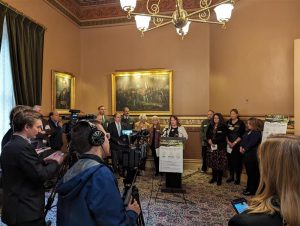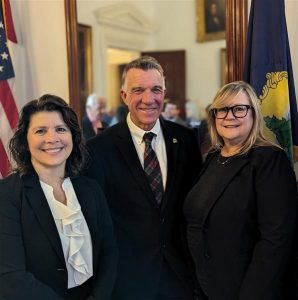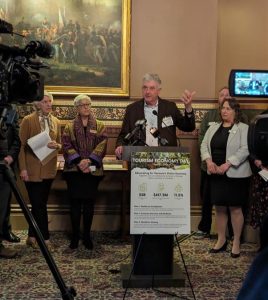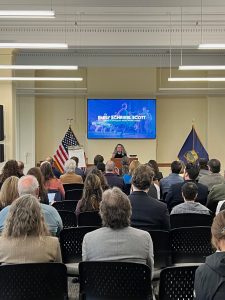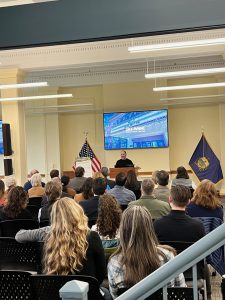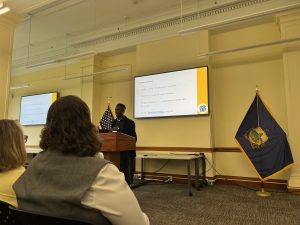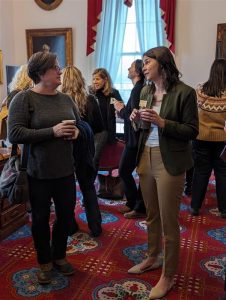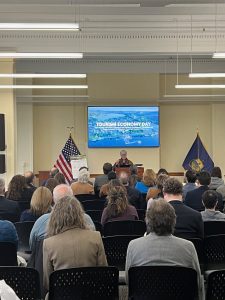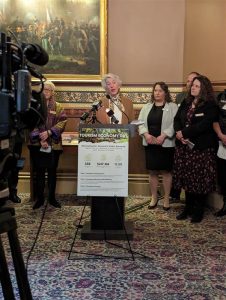Halfway Point: Taking Stock of the Legislative Session and Vermont’s Affordability Challenges
With crossover complete, the Vermont Chamber advocacy team provides a comprehensive status update on Vermont’s most pressing affordability issues—education and property taxes, housing, healthcare, and business cost and regulation. Early measures in education and property taxes show promise in easing financial pressures, while proposed reforms in housing and healthcare remain under review amid evolving priorities. Key issues are summarized below.
Education Finance and Delivery
Following an average property tax increase of 14% last year, Vermont’s education finance and delivery system has reached a critical inflection point. With a clear focus on progressivity, transparency, and local control, the Legislature is examining the Administration’s proposals, which aim to address nearly every aspect of the current education finance framework—from how property tax credits are calculated to new measures designed to reduce disparities among school districts. However, significant questions remain regarding the potential for cost containment and the methodologies that will be employed to achieve it.
- Yield Bill Passes Ways and Means: Curbing Property Tax Hikes: The House Ways and Means Committee passed the yield bill (9-2-0), proposing a uniform change to both non-homestead and homestead property tax rates for the upcoming fiscal year. The bill uses the one-time $77.2 million general fund transfer proposed by the Administration to buy down the property tax rate to an average increase of 1.1% versus the 5.9% increase that would have been realized without the transfer.
- Education Reform Gets More Time: Due to the complexity of education reform—covering proposed changes to district sizes, funding, governance of Centers for Technical Education (CTE), prekindergarten, and a potential shift to a foundation formula—lawmakers are expected to take additional time beyond the standard crossover deadline. These decisions will ultimately determine whether cost containment can be achieved this session.
Housing
The continued lack of affordable housing is making living in Vermont more challenging for workers and families. Thoughtful reforms—such as streamlining permitting, encouraging higher-density and mixed-use developments, and revising financing mechanisms—are needed to help stabilize prices, support community resilience, and increase housing output.
- Housing-Focused Infrastructure Financing Gains Momentum: Public infrastructure remains a major barrier to housing development. A housing-focused version of the long-proposed project-based Tax Increment Financing (TIF) program has gained momentum in the Senate, alongside a bond bank program designed to extend and enhance water and sewer service capacity for housing in municipalities.
- Middle Income Programs Get Policy Approval; Budget Approval Pending: Programs designed to bridge the financing gap for housing developers or homebuyers have received support in policy committees, although the final budget for these initiatives has yet to be determined.
- Act 250 Appeals Study Expedited: The timeline for a study on Act 250 appeals was expedited to allow the Legislature to develop policy proposals in time for the next session.
Healthcare
Commercial healthcare premiums have increased by double digits over the past three years while healthcare providers continue to face staffing and funding challenges in delivering the access to care communities need; 45% of respondents to the Vermont Chamber’s Business Climate Survey have adjusted their benefits in response to rising costs—with smaller businesses feeling the impact the most.
- Reference-Based Pricing: Reforms Under Consideration to Curb Costs: In efforts to control costs, the Senate is moving forward with a proposal to implement reference-based pricing (RBP) before phasing in global hospital budgets.
- New Law Unmerges Markets, Double-Digit Premium Increases Likely: In a swift legislative move, Vermont’s Legislature permanently unmerged the individual and group healthcare markets—a measure signed into law by Governor Scott—to shield small businesses from the higher costs of the individual market. However, the path to addressing the underlying cost drivers remains unclear and another year of double-digit increases may be unavoidable.
- Workforce and Demographic Challenges: Further Action Needed: While current programs remain essential, little progress has been made in developing solutions to address the growing staffing shortages and demographic shifts impacting the healthcare system. Additional proactive measures are needed to ensure long-term workforce sustainability and maintain access to quality care.
Vermont’s Business Climate
The Vermont Chamber’s Business Climate Survey revealed a stark reality: respondents consistently voiced frustration with Vermont’s business environment, citing rising operational costs, regulatory hurdles, and a lack of workforce availability. The Vermont Chamber’s focus remains aligned with what Vermonters expressed at the polls in November—addressing affordability, spurring economic growth, and tackling Vermont’s toughest challenges head-on.
- Military Retiree Pension Exemption Ignored: Despite strong bipartisan support in the House and Senate, legislation that would exempt the pensions of military retirees and survivor benefits from taxation has not been taken off the wall, leaving Vermont as the second least desirable state for military retirees. Vermont’s veteran population is declining at a rate of 2.7% annually, compared to a national decrease of 1.6%.
- Balanced Comprehensive Data Privacy Gains Traction: A Comprehensive data privacy bill has received unanimous committee approval as it moves through the Senate. While compliance with this law will carry costs, the bill aligns with data privacy standards in other New England states and avoids exposing businesses to costly legal fees by excluding a private right of action.
- Electricity Rate Increases: Two Senate committees have advanced a bill that is raising serious concerns due to its potential to increase electric costs for ratepayers.
- New Business Taxes and Fees Off the Table for Now: While new and increased taxes were front of mind last year, tax increases targeting Vermont businesses have been off the table thus far.
Looking Ahead: What’s Next for Affordability Policy?
As the Legislature moves into the second half of the session, many of these affordability proposals will face significant hurdles in securing final approval and funding, and things can change dramatically as bills move from one chamber to the other. Proposals that seemed settled in one committee may be completely rewritten or stalled as they face new scrutiny and ideology. Several efforts to deliver some form of affordability remain in play, but competing priorities and budget constraints will shape what ultimately moves forward. Adding to the uncertainty, federal funding fluctuations could impact healthcare, infrastructure, and workforce programs, forcing lawmakers to make difficult trade-offs. The Vermont Chamber will remain engaged at every step, ensuring that affordability remains at the forefront as these critical policies take shape.
SHARE THIS ARTICLE
RECENT NEWS





